Under Armour has teamed up with Canadian Running to produce the Under Armour Diversity Series — an exclusive feature content series designed to highlight and promote individuals and organizations who have demonstrated a commitment to grow the sport of running, support those who are underrepresented and help others. Over the next six months, the series will feature stories and podcasts highlighting these extraordinary Canadians who are making a difference in their communities and on the national running scene.
The first feature in the series is Kurt Downes, a teacher and running coach who lives in Windsor, Ont. Downes fits the bill perfectly for this series. Running and sport in general can change a child’s life, and Downes knows this firsthand, as his own life was immediately impacted when he was introduced to track and field. He had teachers and coaches who acted as mentors in his life, and they helped carve his path through the worlds of sport and school. Today, Downes continues to use the lessons his mentors taught him, and every day, he works to provide his own students and athletes with that same guidance he received when he was their age.
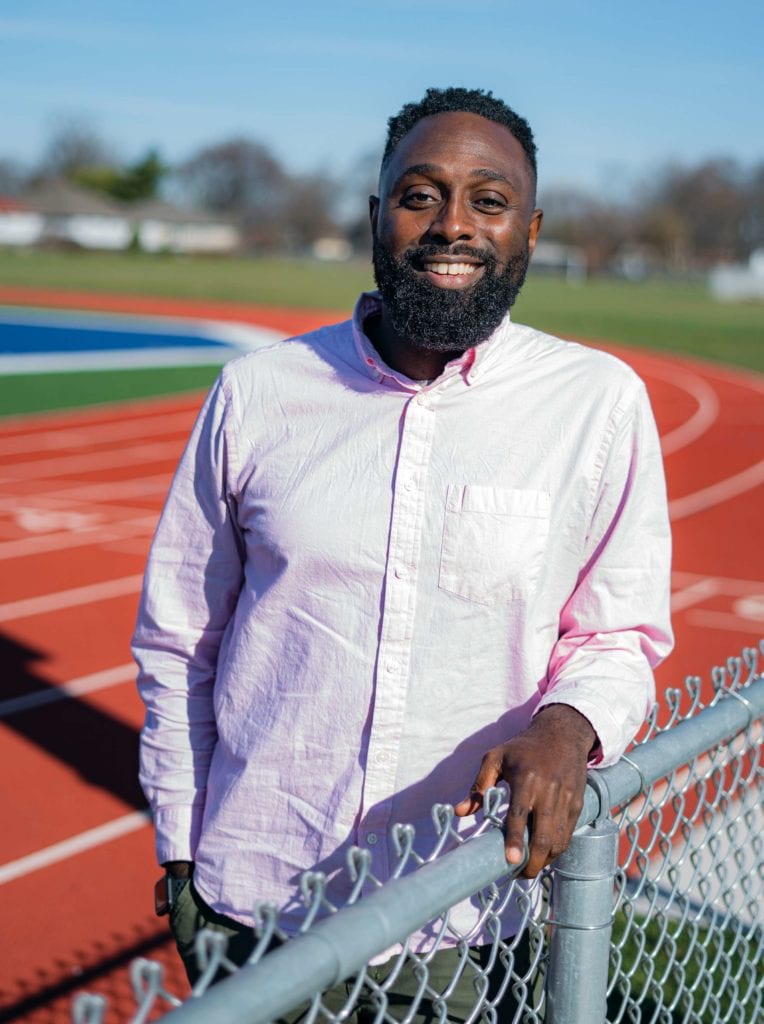
Finding sport
Downes first got started in track and field in elementary school. A teacher, Mrs. Sullivan, saw him run and realized he had a talent for it. Her husband, Downes says, was a coach at another school, and between them, they worked to find Downes opportunities in the sport.
“She got me in with the North York Track Club in Toronto,” Downes says. Another teacher would drive to Downes’s neighbourhood in Scarborough and pick him and other kids up to take them to York University, where they would train. “I got started in high jump and sprints. I ended up doing pretty well.”
Simply finding Downes a spot on the North York Track Club squad wasn’t all the Sullivans did for him. That was big, but even bigger was the fact that they helped get him into St. Michael’s College School in Toronto — a private school they said would give him great opportunities in academics, as well as in athletics.
At St. Mike’s, Downes met more teachers and coaches who would act as mentors to him. One of them was Emile John, a teacher who lived near Downes in Scarborough. John was a long jumper, and he had competed for Saint Lucia. When Downes met him, he had just completed his master’s degree, and was working as a supply teacher at St. Mike’s while still training for and competing in elite sport.
Downes looked up to John, but not just because of his athletics past. John was the first Black man to teach Downes. He was a representation of the person Downes could one day become. “He was always clean-shaven and well spoken, and the presence he kept about himself was incredible,” Downes says.
While at St. Mike’s, Downes matured into one of the best young high jumpers in Canada. After fracturing his back on a jump, though, Downes was forced to sit out his first year of high school. A string of injuries followed, turning most of his high school athletic career into an inconsistent affair.
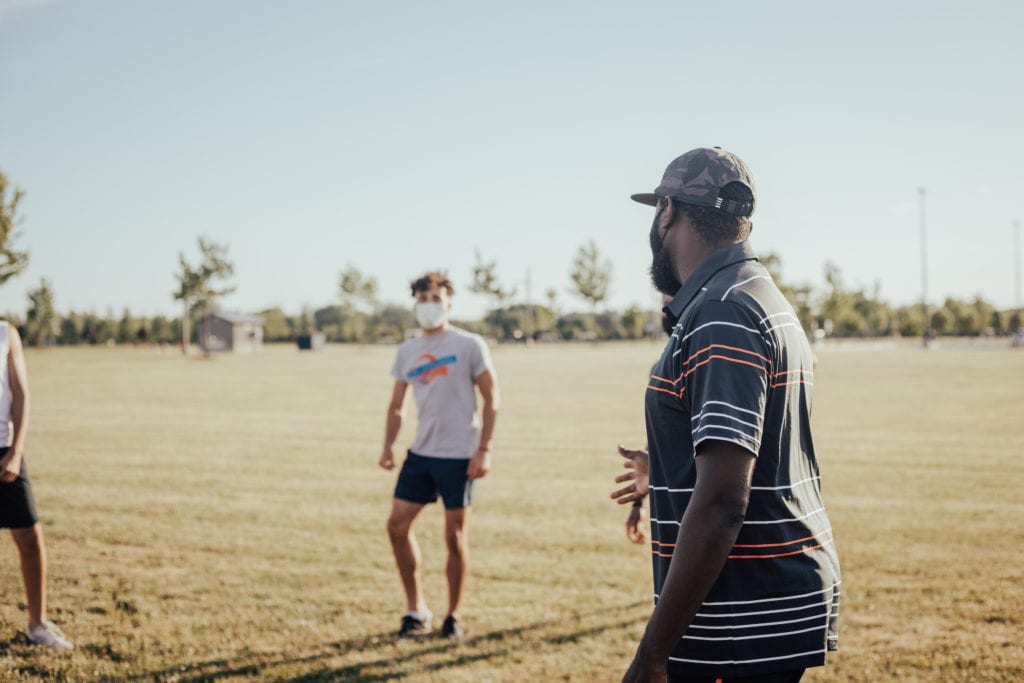
“I’d run something hot, then get hurt again,” Downes says. “Then I’d come back, run again, then get hurt. It wasn’t until my last year that I put it all together.” John helped Downes through these difficult times, driving him to and from chiropractor appointments, working with him in the gym and simply supporting him as he got back to his previous form.
In his final year of school, Downes managed to stay healthy. He competed for St. Mike’s at OFSAA, winning a relay medal, placing fifth in the 200m and in the top 10 in the 400m. These stellar results attracted attention from collegiate track programs in the U.S. But Downes’s hopes of scholarships fell through, and he “floated around for a little bit,” unsure of what his next step should be.
Just as John had helped Downes through his physical struggles, he stepped in to offer guidance when Downes was lost after his final year of high school. “He pushed me to go to the University of Windsor,” Downes says. John had competed in the Canadian collegiate system himself at the University of Toronto, so he knew members of the staff at Windsor. “He said he thought I’d fit in well there, and connected me with them. I’ve been here ever since.”
While studying and competing at Windsor, Downes switched his focus from the track to jumps, and he became a top-ranked athlete in the triple and long jump. He and the team ran, jumped and threw to multiple undefeated seasons, only to lose at nationals in each of Downes’s first four years. In 2003, his last year of school, everything came together, though, and Windsor won the national championship.
Not long after completing his tenure as a Windsor Lancer, Downes’s athletic career came to a sudden halt after he injured himself in training yet again. Downes says now that he didn’t have hopes or plans to fight for a spot on Canada’s Olympic or world championship teams, so when he injured himself this time, he decided to call it a career and move on from elite sport.
Work in the classroom
Today, close to two decades since his last competition, Downes teaches at St. James Catholic Elementary School in Windsor. He has been a teacher for 16 years, four of which have been at St. James. Just like John did for him, Downes endeavours to show his students — many of whom are members of the BIPOC community and newcomer families — what their futures could be.
He does this by bringing a variety of speakers into his classes. “I think it’s important to bring in influential people, period, but especially people of colour,” Downes says. “These kids don’t see success stories of people who came from neighbourhoods like theirs; people who came from immigrant families like they do; people who talk like them and look like them.”
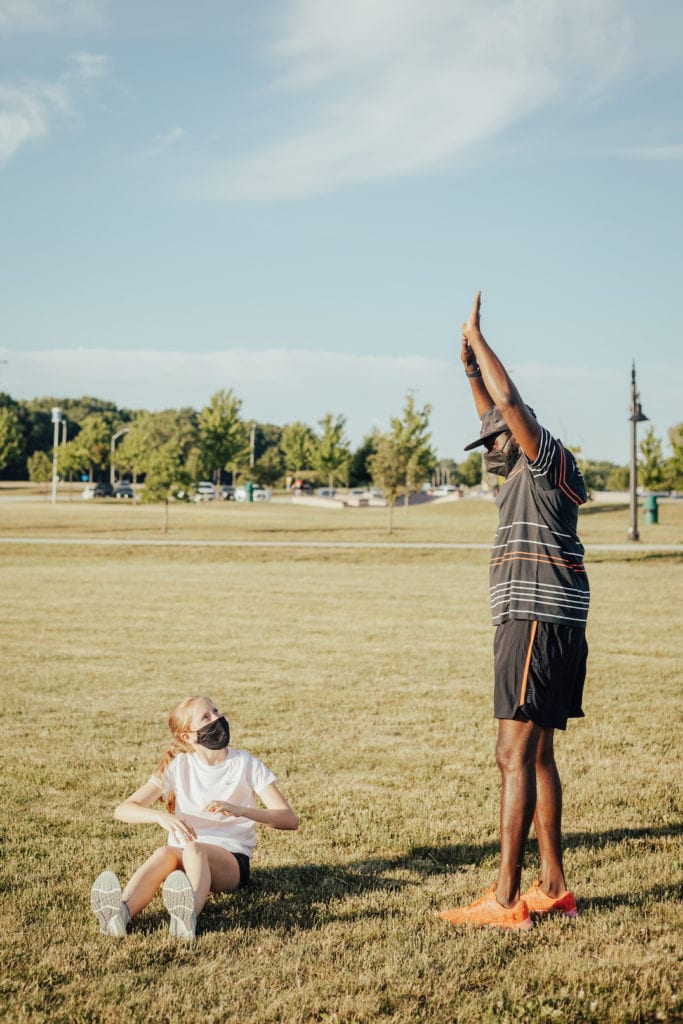
Even in the classroom, for the most part, these kids see white teachers. “They don’t see teachers like them,” Downes says. “That’s not to say these teachers aren’t amazing, but representation matters.” Downes knows this, because he grew up seeing the same thing in his classrooms as a student. It wasn’t until John came along at St. Mike’s that Downes had a Black teacher who showed him that he could one day take on a similar role.
Downes has invited a lot of people to his classes, many of whom are former professional and elite athletes who now work in the Windsor community. A perfect example of the kind of guest speaker he invites is Jamie Adjetey-Nelson, a Canadian decathlete who competed at Windsor before winning gold at the 2010 Commonwealth Games in India. Now retired from elite track, Adjetey-Nelson works as a police officer in Windsor.
“These kids need to see these success stories,” Downes says. “Like, ‘Look, he got a scholarship, he played at university, he was an academic All-American.’ They tell their stories of how they used sport to gain advantages. I thought that was a pretty powerful message for kids.”
Life as a coach
On top of his work as a teacher, Downes is a coach at Windsor’s Border City Athletics Club. When he was first introduced to track and field, everything changed for him. His life was headed in one direction, but after joining the North York Track Club, his path took a hard turn toward the life he knows now. He has seen what sport can do for a child — he’s a living example of the places sport can take students. (Most recently, Downes was named to the Team Canada coaching staff for the Tokyo Olympics.)
Just as he uses the classroom, Downes uses the track to introduce his athletes to futures they might not know exist as options for them. He has already run many programs for his athletes, but he wants to expand his operation and touch even more lives. “We want to focus on Black and racialized youth,” Downes says. “Newcomer families, families that have yearly earnings of lower than $40,000.”
Many of these families, Downes says, don’t even realize that sport is the key to their children’s futures. He points to two students — a couple of sixth-grade girls in his class who come from two different newcomer families who only recently moved to Canada from South Sudan. Downes says they’re both innately talented runners.
“We used to run 2K in the mornings at school, and these girls would do it so gracefully. I would just watch and be like, ‘You two have running written all over you.’” Downes talked to the girls’ parents and explained how talented their daughters are. He offered to pay for them to train with Border City Athletics, and he even told them that he could arrange for pickups and drop-offs before and after practice. He told the parents his vision for their daughters, and where running could take them one day, but they turned down his offers.
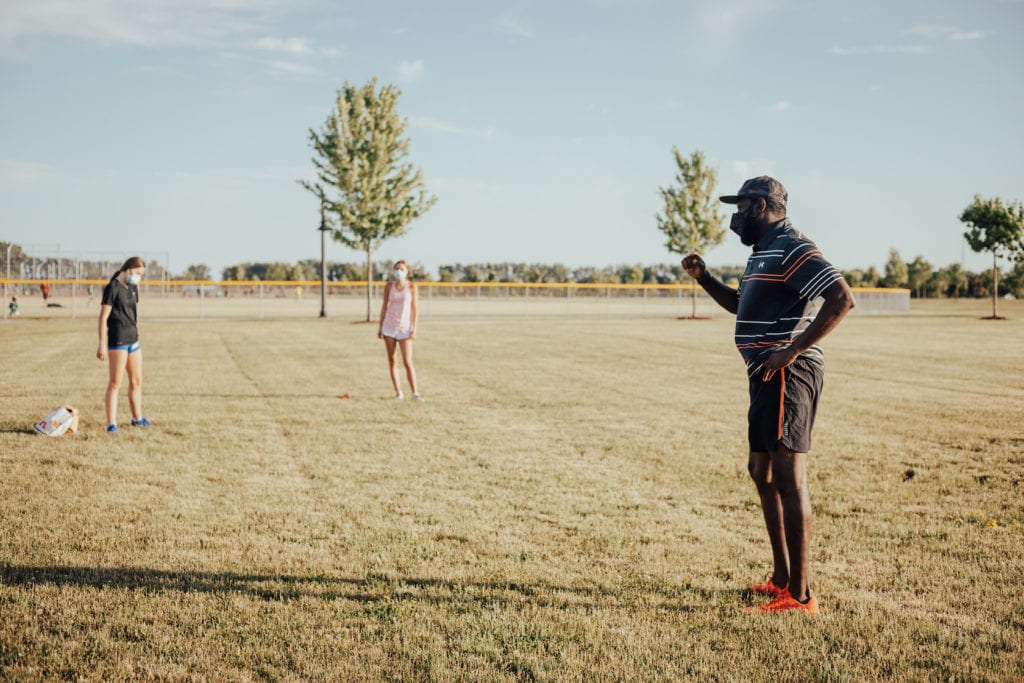
“They said the girls are needed at home,” Downes says. He tried convincing the girls themselves, but they, too, have no interest in running. “I try to tell them what they could do and I show them videos of other young female athletes from Africa, but they just don’t care.”
That’s not the way it always goes for Downes, though, and he points to eight other girls he teaches at St. James Catholic Elementary. Ranging from third to fifth grade, these eight girls are all members of families who came to Canada from Africa, and Downes says they cannot wait to get started on the track.
“They ask me every day — ‘Sir, when are we going to start, when are we going to start?’” Once COVID-19 restrictions ease across the province, Downes will finally be able to introduce these girls to Border City Athletics.
These are the kinds of kids Downes wants to help. He knows this sport can change their lives, and he wants to ensure that happens. “That’s where my focus is, because I don’t think these kids get enough attention,” he says. “A lot of the time, Mom and Dad want them at home, but I try to explain that there’s a huge opportunity here. I just think it’s a no-brainer to provide these opportunities to these kids.”
While Downes devotes a lot of his time to the next generation of runners and jumpers, he also coaches a number of elite athletes who compete on the world stage and are looking to represent Canada at the Olympics. Kelsey Balkwill is one of these athletes, and she has been working with Downes for years. Balkwill, a 400m hurdler, grew up just outside of Windsor, and she started training with Downes when she was in high school. Downes is still her coach today as she works toward qualifying for the Tokyo Olympics.
After graduating from high school, Balkwill went to the University of Miami for her undergrad before returning home and attending the University of Windsor, where she ran and pursued her masters of human kinetics, a degree that she’s completing this spring. After working with Downes for so many years, Balkwill has plenty of stories about him, but her masters degree is a great place to start.
“He was one of the only people who wasn’t pushing me, but accepting that I wanted to go back and do my masters,” she says. “Most people told me I had to just focus on the Olympics, and he was like, ‘No, you can do both.’” This falls right in line with everything else Downes preaches to his younger athletes. He recognizes that sport doesn’t have to be a child’s life, but it can instead drive that life toward education and careers.
“He’s got this philosophy of putting kids first and influencing their lives and not just pushing them toward track and field,” Balkwill says. She now works alongside Downes at Border City Athletics, and she sees this philosophy in action day after day. “He pushes people to be better in all aspects of their lives, not just in sport.”
Downes is someone who truly cares about each of his athletes, Balkwill says. They’re not just names on a start list or opportunities to pad his coaching resume — Downes makes sure to get to know every kid who joins the club.
“He could tell you all about the kids,” Balkwill says. “Their siblings’ names, the other sports they love, whatever.” This, she says, shows the kids that they belong somewhere and have a support system outside of their family. “Kurt wants to create a space where everyone feels that they belong.”
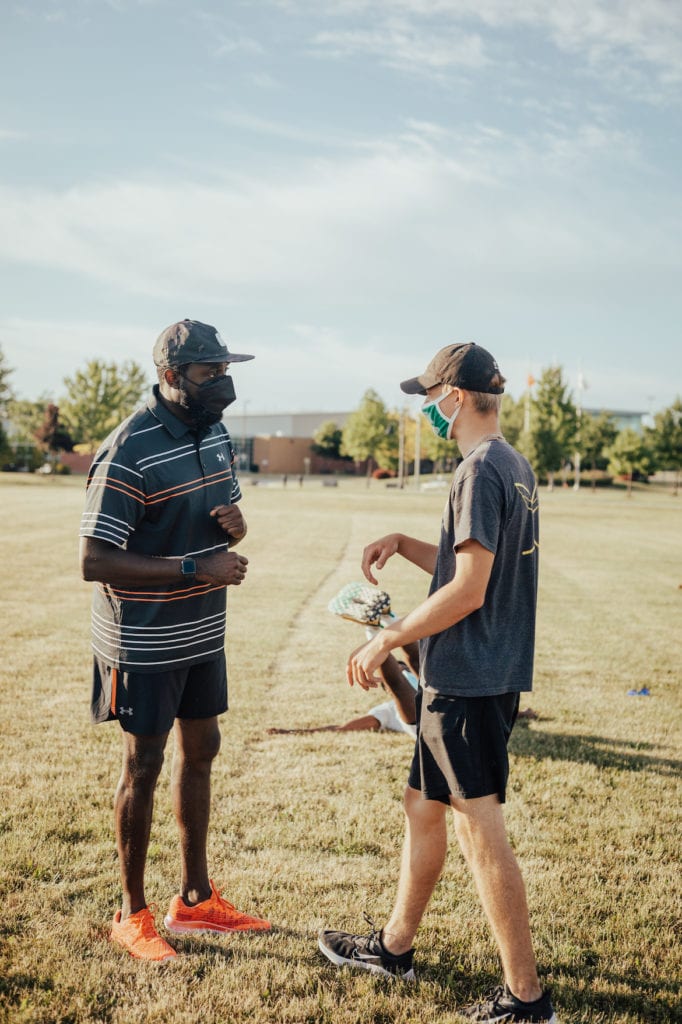
Driving the sport
On top of personally introducing sport to so many children, Downes has actively worked on a number of programs and initiatives to better the lives of female, Black and racialized athletes in Canada. Following the racial unrest in the U.S. that was sparked by the killing of George Floyd in 2020, Downes began working with Ontario University Athletics (OUA) and the Black Canadian Coaches Association to improve the current landscape for Black athletes in Ontario collegiate sports.
OUA CEO Gord Grace himself reached out to Downes and asked him if he would like to help in this initiative. “He said they wanted to be leaders in this area,” Downes says. “He said, ‘We don’t want to sit back and react, we want to do what’s right.’” Downes, the OUA and the BCCA met on a weekly basis to discuss ways to make a positive change in the OUA.
“We had collegiate athletic directors, VPs from universities, student reps — a lot of influential people,” Downes says. “It was great to have so many discussions to see what people want to change in the OUA. If we change the climate and the culture, or attempt to anyway, in the OUA, it should have a broader stroke for the other conferences in U Sports.”
An initiative Downes drove even more than his work with the OUA was the recent Women Can Summit, a Border City Athletics event held in November 2020. This was a fundraiser for an initiative Downes has run previously, called the Girls Can Program, which in the past reached around 50 girls per session, and was organized as a way to empower and inspire young women in and around Windsor.
“The Girls Can Program was on a small scale,” Downes says. “I always wanted to do it bigger.” The Women Can Summit was the key to that, and when COVID-19 hit, it gave Downes plenty of time to plan it. He reached out to a wide variety of women across North America, including Olympians, coaches, nutritionists and sport scientists.
“After I got a couple of people to agree to participate, it just went bananas,” he says. “I was getting yeses from everyone, it was just like boom, boom, boom, it was insane.” The summit’s lineup of panelists and speakers was packed with successful women from all corners of sport, and the virtual event ended up raising more than $4,000 for young girls in Windsor.
Whether he’s trying to convince a sixth-grader to pick up running or planning an event like the Women Can Summit, Downes’s actions always come down to the future of the sport and of his athletes. In his time at Border City Athletics, the club has sent close to 30 athletes to the NCAA on scholarships, and almost 20 on scholarships to U Sports schools. So far, 25 of these athletes have graduated with undergraduate degrees, six have completed their masters, three are pursuing medical degrees and two are in the thick of working toward PhDs. Additionally, one of these former Border City athletes has started a non-profit foundation.
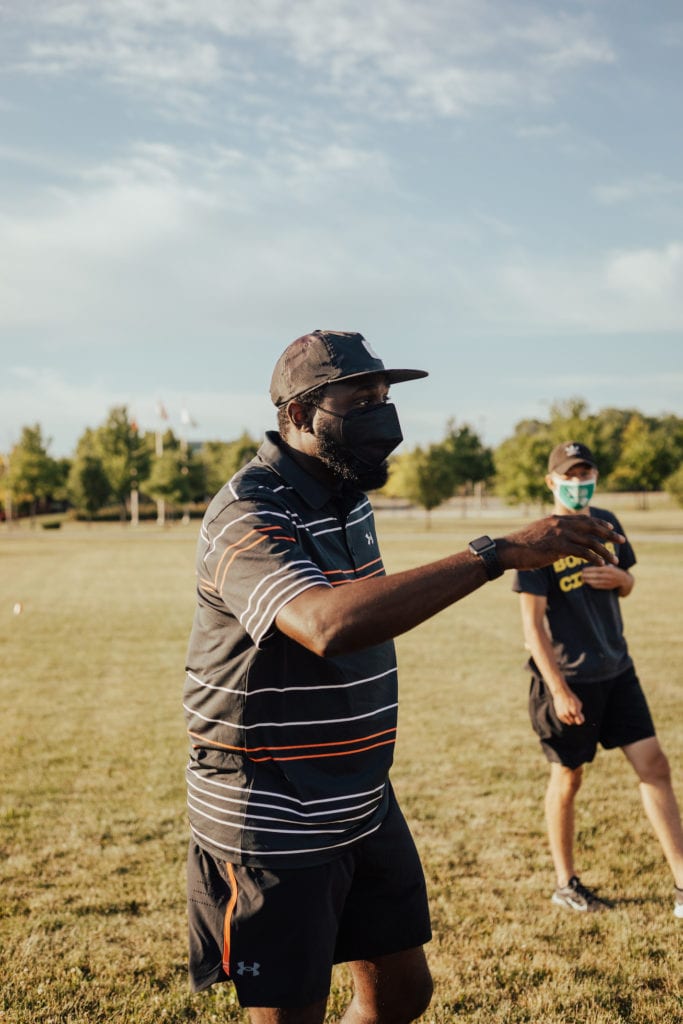
It’s easy to tell parents that sport can change their child’s life. It’s the same thing Downes and his family heard when he first got into track and field. It takes a special person — someone dedicated who truly cares about the end result for each child — to turn those words, that promise of what sport could do for a child, into a reality.
Downes had those dedicated and caring people in his life growing up, and they’re a big reason he made it to where he is today. And now, years later, he’s doing exactly the same thing for the dozens and dozens of kids he works with, both in the classroom and on the track, ensuring that they each get every life-changing opportunity they deserve.
Under Armour gives back
We selected Kurt Downes to be featured in the Under Armour Diversity Series because of his inspiring commitment to honouring and promoting diversity in the classroom and at the track. With this series Under Armour has pledged $5,000 in product donation to the club or team of each featured individual’s choice. Downes will be putting this donation to good use for the kids at Border City Athletics who need new gear for this season.
To learn more about UA’s commitment to diversity, equity and inclusion, click here.
